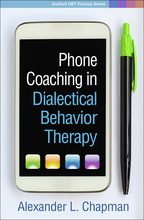Phone Coaching in Dialectical Behavior Therapy
Alexander L. Chapman
HardcoverPaperbacke-bookprint + e-book
Hardcover
orderNovember 8, 2018
ISBN 9781462537365
Price: $56.00 214 Pages
Size: 6" x 9"
Paperback
orderNovember 8, 2018
ISBN 9781462537358
Price: $37.00214 Pages
Size: 6" x 9"
This is the first comprehensive guide to phone coaching in dialectical behavior therapy (DBT)—an integral part of treatment that many clinicians find challenging. What are the principles and goals of phone coaching? What limits should be set? How can a therapist manage suicide risk during a brief call? DBT expert Alexander Chapman addresses these and other critical practical questions in this accessible book. He provides guidelines for coaching core DBT distress tolerance and emotion regulation skills; coaching “dos and don'ts”; and tips for structuring each call's beginning, middle, and end. Featuring many concrete examples, strategies, and model dialogues, the book includes a key chapter on suicide crisis calls.
This title is part of the Guilford DBT Practice Series, edited by Alan E. Fruzzetti.
“The reader is guided to avoid numerous pitfalls in phone coaching, and gains wisdom on critical topics, including handling suicidal crisis calls and using electronic communication such as texting. Chapman makes a clear distinction between phone coaching and therapy. This book will no doubt assist clinicians in delivering comprehensive DBT effectively while balancing their work and personal lives. As Chapman states, many clinicians get that 'deer-in-the-headlights look' when introduced to the notion of phone coaching—but this engaging, motivating, often humorous book makes this mode accessible and achievable.”
—Jill H. Rathus, PhD, Department of Psychology, Long Island University Post
“Chapman is a masterful DBT clinician and teacher who describes how to structure phone coaching calls, effectively orient the client to them, and utilize DBT strategies during calls. He provides fabulous instructions for coaching the emotionally dysregulated and suicidal individual to bring about lasting change, with an emphasis on strengthening and generalizing behavioral skills in difficult situations. The dialogues with patients quoted in every chapter are worth the price of the book on their own! This how-to guide fills a significant gap in the DBT literature, and is entirely consistent with expert recommendations for the treatment of suicidal clients.”
—Charles R. Swenson, MD, Department of Psychiatry, University of Massachusetts Medical School
Table of Contents
1. Introduction and Overview2. Setting the Stage for Effective Phone Coaching
3. Orientation to Phone Coaching
4. Navigating and Structuring Phone Coaching Calls
5. Core DBT Skills Coaching Principles and Strategies
6. Coaching in Emotion Regulation and Distress Tolerance
7. Navigating Suicide Crisis Calls
8. Principles and Strategies to Address Challenges and Observe Limits
9. Skill Generalization and the Development of Self-Coaching Skills
